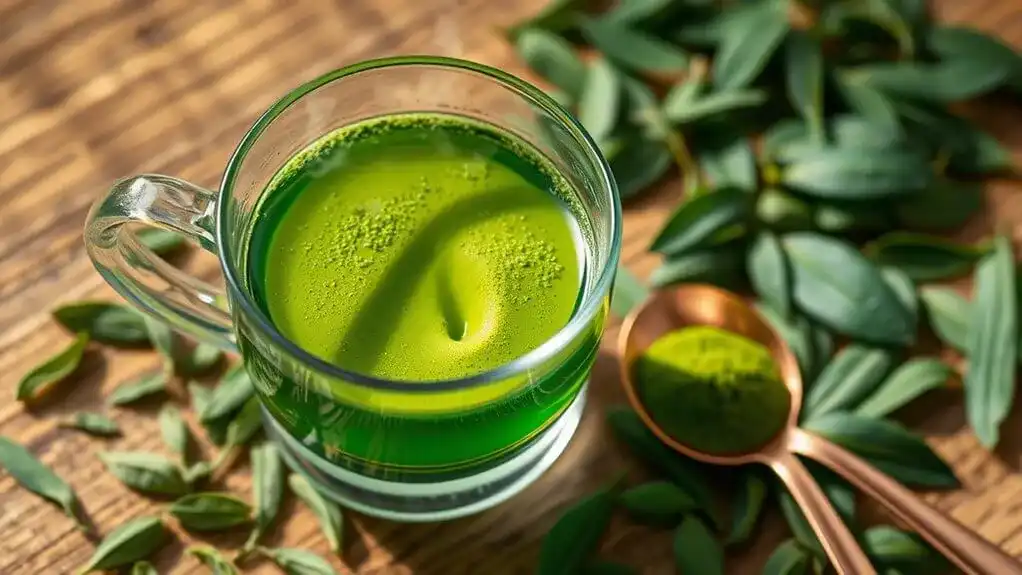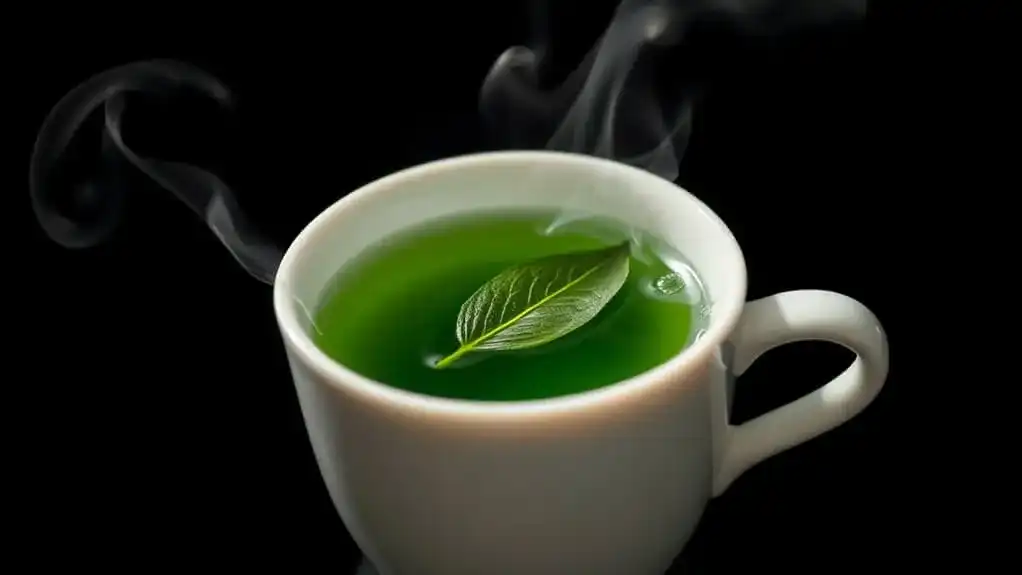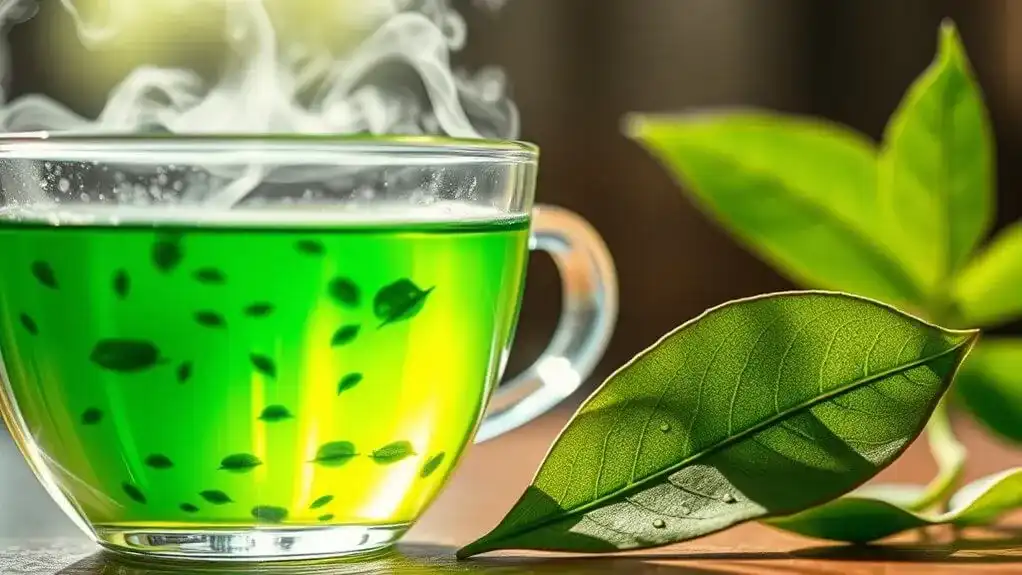Tea's health benefits come from three powerful compounds working in harmony. Catechins fight disease and boost metabolism, while L-theanine promotes mental clarity and reduces stress. Antioxidants protect cells from damage and support immune function. Different tea varieties offer unique advantages – from black tea's heart-healthy properties to green tea's metabolic benefits. Understanding these compounds opens the full potential of this ancient beverage's remarkable impact on wellness.
Key Points
- Catechins in tea act as powerful antioxidants, scavenging harmful free radicals and promoting gut health while preventing chronic diseases.
- L-theanine increases alpha brain waves, reducing stress and anxiety while improving focus without causing drowsiness.
- Tea's antioxidants work synergistically with the body's natural defenses to protect cells from oxidative stress and environmental damage.
- Different tea types offer unique compounds: black tea's theaflavins support heart health, while green tea's EGCG enhances metabolism.
- Regular consumption of 4-7 cups daily provides optimal health benefits, including reduced heart attack risk and improved cardiovascular function.
The Power of Catechins: Tea's Natural Disease Fighters

While many people enjoy tea simply for its taste and comforting qualities, it's the powerful compounds called catechins that make this beverage a potent ally in disease prevention. These remarkable antioxidants work by scavenging harmful free radicals and preventing oxidative stress in the body. The catechins benefits extend beyond basic protection, as they actively bind to proteins, lipids, and nucleic acids while modulating key metabolic pathways to reduce inflammation. Green tea is particularly beneficial as it contains four main catechins that comprise approximately 25% of the leaf composition. Studies have shown that catechins support gut microbial health by promoting beneficial bacteria while inhibiting harmful ones.
Research shows that regular tea consumption supports chronic disease prevention, including cardiovascular problems, type 2 diabetes, and various cancers. What makes catechins particularly effective is their synergistic nature – all types working together rather than individually. They're especially powerful when combined with caffeine, helping to improve metabolic health, enhance fat oxidation, and regulate blood pressure. Research suggests consuming at least seven cups daily may provide optimal cardiovascular benefits and reduced mortality rates.
L-Theanine: The Mind-Calming Compound in Your Cup

One of tea's most remarkable compounds, L-theanine, offers unique calming properties that set it apart from other natural substances. L-theanine benefits include increased alpha wave activity in the brain, promoting a state of relaxed concentration without drowsiness. This unique amino acid helps reduce stress, anxiety, and the jitters often associated with caffeine consumption. Maximum brain benefits can be achieved by consuming 2-6 cups daily.
Research shows that L-theanine sources, primarily found in tea leaves, can improve cognitive function and mental focus, particularly in older adults. It's also shown promise in enhancing sleep quality by modulating important brain chemicals and reducing resting heart rate. Additionally, L-theanine supports immune function and may help lower blood pressure through its stress-reducing properties. Pregnant and nursing mothers should avoid L-theanine supplementation due to limited safety data. While more research is needed, current evidence suggests this compound plays a significant role in tea's reputation as a health-promoting beverage. Since tea is the sole dietary source of L-theanine without supplementation, incorporating it into your daily routine can be particularly beneficial.
Antioxidant Mechanisms: How Tea Protects Your Cells

Tea's powerful antioxidant compounds work through multiple mechanisms to protect cells from oxidative damage. Catechins, the primary antioxidants in tea, achieve this protection through antioxidant synergy with the body's natural defense systems. They scavenge harmful free radicals while simultaneously activating endogenous antioxidant enzymes, creating a dual approach to fighting oxidative stress.
These compounds also excel at preventing lipid peroxidation and chelating metal ions, which helps maintain cellular integrity. Their protective effects extend to DNA, shielding it from UV radiation and other environmental stressors. Tea catechins consistently demonstrate the ability to block LDL oxidation and protect against cardiovascular issues. Research shows that regular consumption of green tea, particularly at ten cups daily, provides optimal cancer prevention benefits. This extensive defense system makes tea particularly effective at preventing cardiovascular disease, supporting neurological health, and reducing cancer risk. The antioxidants work together to regulate key metabolic pathways and strengthen the body's overall resistance to cellular damage.
Tea Types and Their Unique Health Properties

Different types of tea offer distinct health advantages based on their processing methods and chemical compositions. Black tea's fermentation effects create unique antioxidants called theaflavins and thearubigins, which support heart health and combat cancer risks. Green tea's unfermented leaves preserve powerful catechins, particularly EGCG, that boost metabolism and protect brain function. Regular consumption of black or green tea can reduce stroke risk by 21% when drinking three cups daily. White tea is minimally processed compared to other varieties, preserving its natural compounds. L-theanine found in green tea provides stress reduction benefits while maintaining mental clarity.
Herbal tea benefits vary widely, as these caffeine-free alternatives contain diverse plant compounds. Peppermint soothes digestion, while hibiscus helps lower blood pressure. Other varieties like white, oolong, and pu-erh tea each contribute uniquely to health: white tea provides gentle caffeine content with high antioxidant levels, oolong helps fight chronic diseases, and pu-erh aids digestion and cholesterol management. Each tea type's distinct processing method creates specific compounds that deliver targeted health benefits.
Maximizing Tea's Benefits in Your Daily Wellness Routine

To maximize tea's wellness benefits, incorporating it strategically into daily routines requires attention to timing, preparation methods, and complementary dietary choices. Proper tea pairing and brewing techniques greatly influence the extraction of beneficial compounds, particularly antioxidants and catechins. Studies show that the mental focus benefits are most pronounced when tea is consumed in the morning hours. Regular consumption of quality whole leaf or premium tea bags ensures polyphenol content remains intact for maximum health impact.
For best results, health-conscious individuals should follow these evidence-based practices:
- Time consumption for 1-3 cups daily, preferably after meals to enhance fat metabolism
- Utilize precise brewing techniques, including shorter steep times and lower temperatures for green tea
- Avoid combining tea with dairy products, which can diminish antioxidant absorption
- Pair tea with antioxidant-rich foods while avoiding added sweeteners
This systematic approach guarantees maximum absorption of tea's beneficial compounds, particularly catechins and L-theanine, while supporting immune function, cognitive performance, and overall wellness through consistent daily consumption. Regular tea consumption can provide up to a 32% lower risk of heart attacks when drinking four or more cups daily.
Conclusion
Just as a shield protects a warrior in battle, tea's powerful compounds defend the body against disease and decay. Scientists have found that a single cup of green tea contains up to 200mg of EGCG catechins – enough antioxidant power to neutralize millions of free radicals. Whether sipped for serenity or health, tea's ancient wisdom continues proving itself through modern science's lens.
